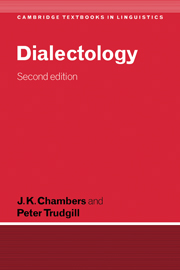6 - Sociolinguistic structure and linguistic innovation
Published online by Cambridge University Press: 05 June 2012
Summary
Dialectologists long ago established that language varies from place to place. Socio-linguists have emphasised that language can also vary from person to person in the same place. For both dialectologists and sociolinguists, it is not the mere fact of linguistic variation that is important. What is important is that that variability correlates with other factors, such that certain variants are more closely associated with one village than another, or with labourers more than managers, or with people speaking to close friends rather than to strangers, or with some other factor.
In Chapter 5 we saw that social groups tend to alter their speech in more formal styles (5.2). Moreover we noticed that all groups tend to alter it in the same direction. In the main example, the index for the (ng) variable in Norwich increased for all working-class and middle-class groups as the formality of the speech situation increased from casual style to word-list style. The fact that style shifts are always in the same direction, no matter which social group is involved, proves that there is a relationship between the two types of variation. It should be possible, then, to explain one in terms of the other. In this chapter, we will consider some of these correlations and their social significance.
Indicators and markers
One plausible explanation for linguistic variability focuses on the fact that whenever there is class differentiation in a linguistic variable, it is the variant used by the higher classes that is ascribed more status or prestige than the other variants.
- Type
- Chapter
- Information
- Dialectology , pp. 70 - 86Publisher: Cambridge University PressPrint publication year: 1998



